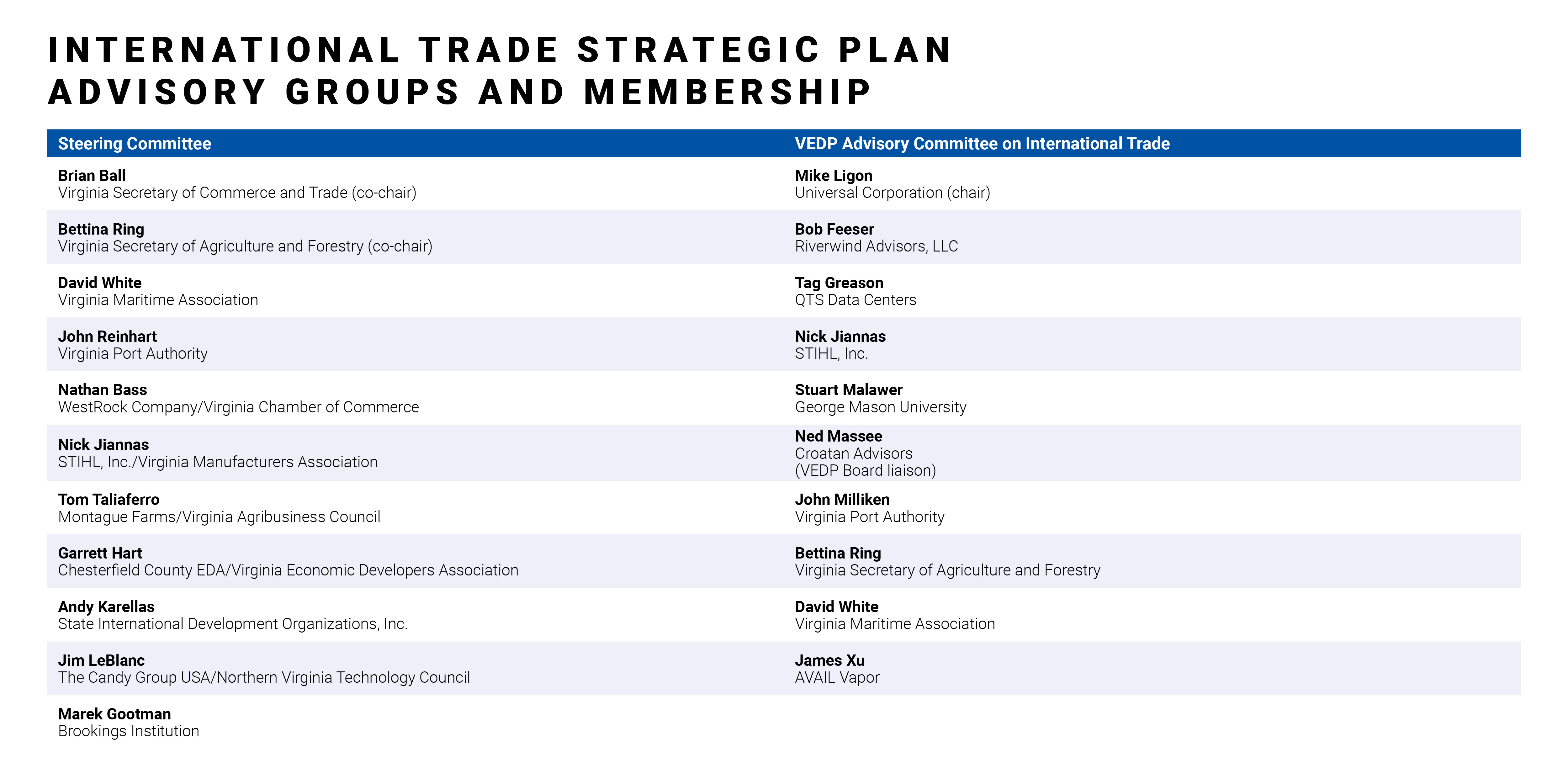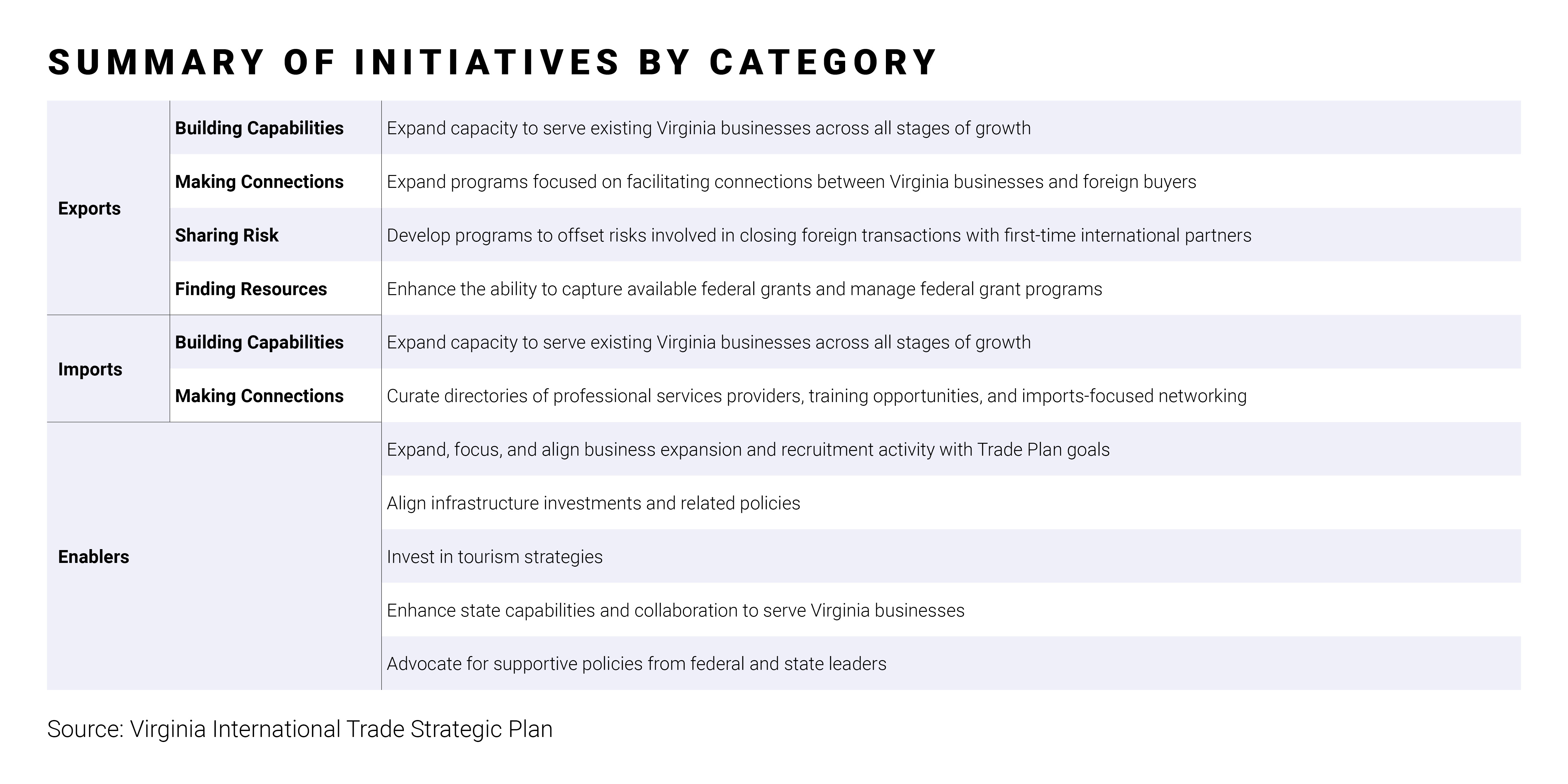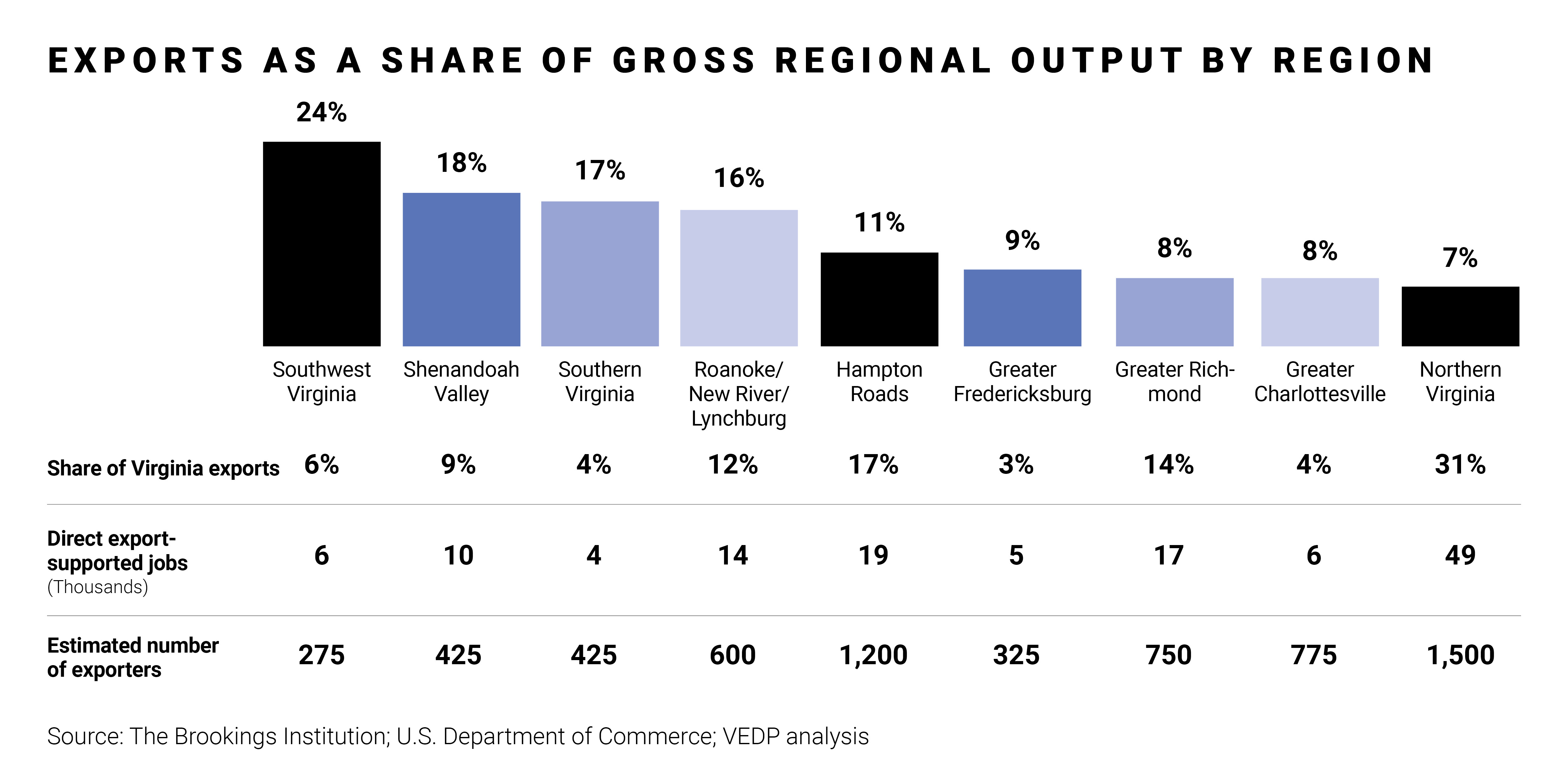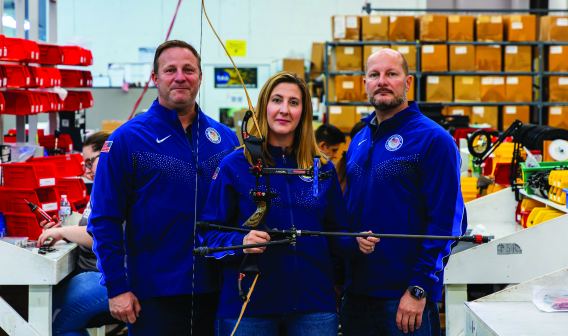Virginia Sets Course for Robust Trade Growth
With Initial Funding Approved and Bold Goals on the Horizon, Virginia's International Trade Strategic Plan is Moving Forward
The fundamental conditions are in place for Virginia to significantly grow its international trade. Now, the Commonwealth is setting a course to capitalize on those assets.
That new direction comes from Virginia’s new International Trade Strategic Plan — a bold, first-of-its-kind initiative that aims to leverage the Commonwealth’s strengths to increase exports of goods and services by 50% over the next 15 years.
Virginia’s strengths are many, from its leading deepwater port to a major international airport to a business climate consistently recognized among the best in the country, according to Mike Ligon, vice president of corporate affairs for Fortune 1000 company Universal Corporation and chairman of VEDP’s Advisory Committee on International Trade (ACIT).
“We have high-quality talent. We have a good standard of living,” Ligon said. “We strongly believe we can become one of the top states for trade.”
Ligon added that hitting that mark requires a significant funding commitment. That’s happening now, as what previously was just a plan is coming to fruition thanks to an initial $1.35 million appropriation made by the Virginia General Assembly in March 2021. That money will go toward launching a new capacity-building program to support businesses with supply chain optimization, expanding existing trade promotion programs from VEDP, the Virginia Department of Agriculture and Consumer Services (VDACS), and other state agencies, and enhancing the ability to capture available federal grants and manage federal grant programs.
One program set to expand under the first allotment of funding is VEDP’s flagship Virginia Leaders in Export Trade (VALET) program, which provides export planning services and assistance to companies. The funding will enable VEDP to expand VALET and a number of other trade programs and increase the companies served by more than 50%. For VDACS, the money will go toward expanding the agency’s international marketing resources.
“It was really an easy sell with the plan’s legislative champions,” said David White, executive director of the Virginia Maritime Association. “They did all the heavy lifting with their colleagues to make this funding possible.”
White, a member of both the ACIT and the International Trade Strategic Plan Steering Committee, noted the existing trade programs’ full participation levels and what he described as a best-in-class reputation.
“When the plan was developed, we started at that time to make it one of our legislative priorities,” he added. “It was a priority for us because we’ve seen that the state is so well-positioned to benefit from increased trade.”
Assembling the Crew
Announced by Virginia Gov. Ralph Northam, the Trade Plan was developed with input from a multitude of voices from the public and private sectors, and includes two advisory committees — the existing ACIT and the new International Trade Strategic Plan Steering Committee, which includes two state cabinet officials as co-chairs: Secretary of Commerce and Trade Brian Ball and Secretary of Agriculture and Forestry Bettina Ring.
Another important factor was the creation of a staff-level working group across agencies that included VEDP, VDACS, the Virginia Tourism Corporation, the Virginia Department of Forestry, and The Port of Virginia. That collaboration is ongoing, with the goal of fulfilling the plan’s initiative to keep staff-level dialogue and coordination going across agencies.
“The first thing I told them was that I applauded them for having a strategic, well-coordinated plan,” said Andy Karellas, executive director of the State International Development Organizations, a nonpartisan, nonprofit association that seeks to share best practices and efficiencies across state governments. “It doesn’t happen very often. Getting all resources and players involved is something that rarely happens at the state level.”
Despite Virginia’s great trade assets, including an international trade development team at VEDP recognized as one of the best in the country, there was still a distance to bridge. The members of these advisory groups were charged with leveraging the Commonwealth’s historic strengths and making the right resource allocation recommendations to address any current limitations.
Nathan Bass, vice president for strategy at WestRock Company and a member of the Steering Committee, was among the representatives from leading exporters who had deep experience to share as well as needs to address.
“Our main objective around trade is to ensure that Virginia has a business-friendly environment that helps our manufacturing operations compete in a global marketplace,” Bass said. “In particular, investments in transportation and logistics infrastructure are critical to ensure that we can effectively and efficiently get our goods to market.”
Ligon added: “It is imperative that we utilize the extreme potential of the port and further enhance the infrastructure in southern Virginia, like upgrading U.S. Route 58. Such improvements would take pressure off our already congested interstates, provide economic opportunity along our southern border, improve the efficiency of deliveries to the Midwest, and much more.”
The Trade Plan focuses on two main priorities:
- Expanding the reach and impact of trade development services to existing Virginia businesses
- Enhancing Virginia’s focus, capabilities, and resources to support existing trade-intensive business in expanding and to attract new export-intensive companies to the Commonwealth
Supporting these are 26 distinct initiatives that fall into one of three categories: Exports; International Supply Chains; and Business Attraction, Infrastructure, Tourism, and Other Enablers. Together, the initiatives have the potential to boost annual exports by nearly $18 billion while generating 150,000 jobs.
“As we look at a post-COVID recovery plan, we need to make sure that trade is a key part of the global reopening,” Karellas said.
The Virginia Maritime Association’s White also recognizes the importance of the timestamp on the plan.
“I think we have a reputation of being business-friendly,” he said. “We need to maintain that. Right now, we are in such a strong position to take what we have to the global marketplace.”
Tuning up an Economic Engine
As Northam said when he announced the plan in 2019, “International trade is a powerful economic engine for our Commonwealth. Maintaining Virginia’s position as the best state to do business and ensuring that all regions of the Commonwealth can participate in our economic growth require that we boost our international trade.”
When the information-gathering phase concluded and the advisory groups completed their rigorous download, they had garnered meaningful input from hundreds of companies, nearly a dozen state and federal agencies, a number of trade associations, and countless leaders from a broad cross section of public and private-sector organizations.
“It was a very well-organized, well-coordinated, and thorough process,” Karellas said.
WestRock’s Bass embraced the opportunity to bring together different constituents to shape the strategy around international trade.
“The collaboration is also consistent with the mission of the International Trade Strategic Plan to address the needs of small to large businesses — those already well established in the Commonwealth and those looking to expand or move here,” he said. “It’s always a good sign when government looks to involve businesses to shape strategy, and I’m looking forward to seeing the plan put into action.”
Trade Secrets? Hardly.
None of the existing trade advantages buoying Virginia’s comprehensive Trade Plan are floating under the radar. Quite the opposite, in fact.
This begins with the hub of the Commonwealth’s trade infrastructure. The Port of Virginia has been undergoing a series of robust renovations and upgrades — all of which act as additional bait to export-heavy companies — including a $1.5 billion infrastructure project adding cranes for mega-vessels, extending berth space, and dredging to widen and deepen the channels to become the deepest on the East Coast.
The overlap in timing with the International Trade Strategic Plan implementation has emerged as a strength itself.
“I see this as being synergistic,” White said. “We have the new capacity and efficiencies of the port that will help Virginia companies conduct trade more efficiently and at a lower cost.”
White also points to the built-in advantages of Virginia’s railways, barge service, increased capacity coming to Interstates 64 and 95, and Dulles International Airport, which handles more than 300,000 tons of cargo annually and provides connections to more than 50 international destinations.
“When you add to that the programs of the International Trade Plan that help Virginia companies grow imports and exports, and attract companies to the Commonwealth…we have a really strong recipe there,” White said.
Confidence is high that once the plan gets underway, it will demonstrate the necessary ROI to knock over the other funding dominoes.
For Ligon, whose company sends over 80% of its U.S. business product through The Port of Virginia, anything short of a comprehensive strategy just won’t cut it.
“We strongly believe that the Commonwealth can become one of the top states for trade, and a fully funded Trade Plan will be required to get us there,” he said.
To achieve the bold goals of the Trade Plan, Virginia needed to be comprehensive in its approach and gather input from a broad cross section of the government and business community.
“Piecemeal isn’t going to get us there,” he said. “It’s going to take all hands on deck.”








